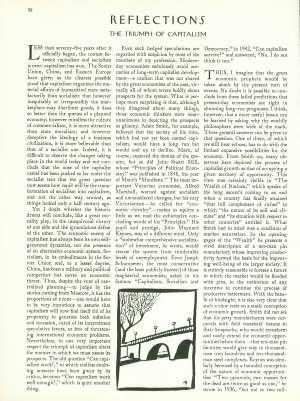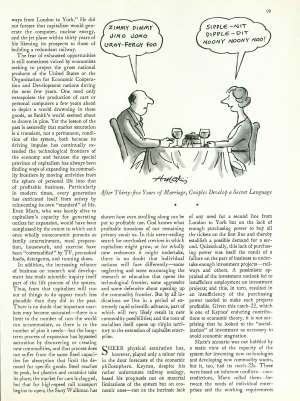“The Triumph of Capitalism” (Socialism is Intellectually Dead, but Central Planning in the Mixed Economy Lives On)
By Robert Bradley Jr. -- February 7, 2014“Less than 75 years after it officially began, the contest between capitalism and socialism is over: capitalism has won… Capitalism organizes the material affairs of humankind more satisfactorily than socialism.”
– Robert Heilbroner, “The Triumph of Capitalism,” The New Yorker, January 23, 1989, p. 98.
A major event in the history of political economy thought occurred in 1989 when socialist economics writer Robert Heilbroner (1919–2005) renounced his belief in central planning in the pages of the New Yorker. For anti-market liberals, this made it official: socialism was out of the mainstream. Socialism could not plan a modern economy and was an open sesame for totalitarianism. Hayek said as much in his 1944 classic, The Road to Serfdom. A trusted voice on the Left confirmed it 45 years later.
David Boaz, the Cato Institute’s longtime scholar of liberty, wrote a tribute upon Heilbroner’s death nine years ago in Reason magazine. MasterResource, with permission, reprints Boaz’s essay for its lucidity and its relevance in today’s political economy debates where mainstream views about perilous man-made climate change and the sustainability of “green” energy are in intellectual trouble.
“The Man Who Told the Truth: Robert Heilbroner fessed up to the failure of socialism” Reason, January 21, 2005.
Robert Heilbroner, the bestselling writer of economics, died early this month at the age of 85. He and John Kenneth Galbraith may well have sold more economics books than all other economists combined. Alas, their talents lay more in the writing than the economics. Heilbroner was an outspoken socialist; if only a libertarian could write an introductory book on economics that could—like Heilbroner’s The Worldly Philosophers—sell 4 million copies.
Defining Socialism
Reading some of Heilbroner’s essays over the years, I admired his honesty about the meaning of socialism. Consider this excerpt from a 1978 essay in Dissent:
Socialism…must depend for its economic direction on some form of planning, and for its culture on some form of commitment to the idea of a morally conscious collectivity….
If tradition cannot, and the market system should not, underpin the socialist order, we are left with some form of command as the necessary means for securing its continuance and adaptation. Indeed, that is what planning means…
The factories and stores and farms and shops of a socialist socioeconomic formation must be coordinated…and this coordination must entail obedience to a central plan…
The rights of individuals to their Millian liberties [are] directly opposed to the basic social commitment to a deliberately embraced collective moral goal…
Under socialism, every dissenting voice raises a threat similar to that raised under a democracy by those who preach antidemocracy.
Few socialists outside the Communist Party are willing to acknowledge that real socialism means trading our “Millian liberties” for the purported good of economic planning and “a morally conscious collectivity.”
Rejection of Socialism
He was not entirely impervious to new evidence, however. In 1989, he famously wrote in The New Yorker:
Less than 75 years after it officially began, the contest between capitalism and socialism is over: capitalism has won… Capitalism organizes the material affairs of humankind more satisfactorily than socialism.
In The New Yorker again the next year, he reminisced about hearing of Ludwig von Mises at Harvard in the 1930s. But of course his professors and fellow students scoffed at Mises’s claim that socialism could not work. It seemed at the time, he wrote, that it was capitalism that was failing.
Then, a mere 50 years later, he acknowledged: “It turns out, of course, that Mises was right” about the impossibility of socialism. I particularly like the “of course.” Fifty years it took him to grasp the truth of what Mises wrote in 1920, and he blithely tossed off his newfound wisdom as “of course.” [1]
Malthusian Misdirection
Alas, in that same article he went on to say that while socialism might not in fact produce the goods, we would still need to reject capitalism on the grounds of … let’s see … I’ve got it—environmental degradation. Yeah, that’s the ticket.
While he had managed to wriggle free of the ideas he learned in the 1930s, he was still stuck in the 1970s when, like Paul Ehrlich, he issued dire predictions about the imminent exhaustion of natural resources.
In his 1974 book An Inquiry into the Human Prospect, Heilbroner wrote, “Ultimately, there is an absolute limit to the ability of the Earth to support or tolerate the process of industrial activity, and there is reason to believe that we now are moving toward that limit very rapidly.”
On the big issue of capitalism vs. socialism, though, he did continue his rueful acknowledgment of error. In 1992, he explained the facts of life to Dissent readers:
Capitalism has been as unmistakable a success as socialism has been a failure. Here is the part that’s hard to swallow. It has been the Friedmans, Hayeks, and von Miseses who have maintained that capitalism would flourish and that socialism would develop incurable ailments.
All three have regarded capitalism as the ‘natural’ system of free men; all have maintained that left to its own devices capitalism would achieve material growth more successfully than any other system. From [my samplings] I draw the following discomforting generalization: The farther to the right one looks, the more prescient has been the historical foresight; the farther to the left, the less so.
He also noted then that “democratic liberties have not yet appeared, except fleetingly, in any nation that has declared itself to be fundamentally anticapitalist.”
May the socialists in Cambridge and Cambridge, and the people struggling to create decent societies around the world, especially in Africa, the Arab world, and the ex-Communist countries take the frank (albeit delayed) honesty of Robert Heilbroner to heart.
Robert Heilbroner, Reflections, “THE TRIUMPH OF CAPITALISM,” The New Yorker, January 23, 1989, p. 98
[1] RLB Note: Mises 1920 essay refuting socialism, “Economic Calculation in the Socialist Commonwealth,” revolves around the economic calculation problem where the all-property State, a monopolist, buys and sells to itself to make scarcity-pricing impossible.


In his book The Capitalist Revolution: Fifty Propositions About Prosperity, Equality and Liberty, sociologist Peter. L. Berger points out that Capitalism is an economic and rational profit making system and nothing else. In contrast, Socialism is an overarching world view of society, social change, and historical purpose. Economic rationality does not have a mythical dimension. It has an ideological dimension (Smith, Hayek, Weber, Mises, Heilbroner) but it lacks myth. We can speak of a Protestant work ethic but not a Protestant myth of Capitalism.
On the other hand, Socialism has a mythic dimension that is quasi-religious. Socialism espouses the myth of progress. Socialism provides a quasi-religious “home” for those alienated by the rationality of modernization.
Most importantly, Berger points out that Capitalism can not legitimate itself; while the Socialist myth provides a comforting legitimation. Capitalism is about “creative destruction” of unprofitable businesses, obsolescent technologies, political fiefdoms, and even entire communities (Detroit), as Joseph Schumpeter stated. Thus, Capitalism has a high “dislocation” quotient. This dislocation breeds a “homeless mind” eager to embrace the Socialist myth.
When society is in trouble it needs legitimating symbols, inspirational rituals, and founding principles for support. The recent Great Economic Deformation is just such a crisis with 2 million dropouts from employment.
Berger puts this in the form of a Proposition: “Capitalism has a built-in incapacity to generate legitimations of itself, and is particularly deprived of mythic potency; consequently, it depends upon the sheer facticity or its association with other, noneconomic legitimating symbols.”
Neither poets nor solar power advocates sing the praises of the Dow Jones average, internal rates of return, or non-subsidies for market rate electricity. Goldman Sachs stock market experts are not willing to risk their lives in defense of the Fortune 500; U.S. Marines are. Solar and wind farm developers embrace crony capitalism with massive subsidies because it has a strong legitimation of jobs and clean air (despite that the actual consequences may be the opposite).
This leaves a free market defense of energy markets in a one-down position because it does not have the mythic power that we see in those true believers (Eric Hoffer) in global warming, climate change, and a utopia of distributed decentralized electric generation my each household that no longer needs to alienating bureaucratic structures of large public utilities. Now, even Leftist libertarians embrace rooftop solar power despite its non-rational economic feasibility.
Recently, there has been a news release about possible terrorism of an electric power substation in California occurring around the same time that large public utility had opposed a proposal to allow Community Choice Aggregators to buy and sell their own power (at higher prices that could be obtained from the monopolistic big public utility). Could the act of terror be connected? We don’t know.
Plato said society must produce “noble lies” to legitimate wars and public policies. Global warming is a strong candidate for a “noble lie.”
The implication is that combating Socialism based on rationality, facticity, and reason won’t work because of the powerful cultural system of Socialism. Capitalism can only be legitimated empirically or by indirect means. Global Warming can be legitimated by the mythic power of environmentalism saving the planet (and jobs).
One tack to take in fighting the ideological war is to expose Global Warming as a myth. Scientists, environmental engineers, academics, and the cognitive intelligensia refuse to see the mythical dimension in their legitimations partly because their livelihoods, social status, and political power depend on it.
A “sociology of knowledge” perspective of global warming and the environmental movement might be one way to understand the ideological war between Capitalists and Socialists when its comes to renewable energy.
Joshua Muravchik wrote a critical book on socialism which PBS turned into a video. I was surprised because PBS is full of lefties.
http://www.pbs.org/heavenonearth/transcript.html
Joshua Maravchik’s book “Heaven on Earth” is one of my all time favorite books, but it is not up to date with how Neo-Marxism has morphed into environmentalism, especially a whole subsidized energy economy of renewable power.